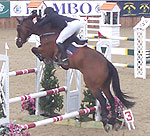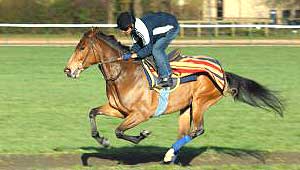Electrolyte Supplements for Horses - prevent dehydration
 If your horse or pony has been working
hard and is sweating after exercise he may need an isotonic solution of
electrolytes to correct an imbalance and prevent dehydration.
If your horse or pony has been working
hard and is sweating after exercise he may need an isotonic solution of
electrolytes to correct an imbalance and prevent dehydration.
This article gives advice on choosing and giving electrolyte supplements
to your horse.
The use of an equine electrolyte supplement has the
potential to improve a horse's performance, aid recovery
after strenuous exercise and avoid dehydration.
Electrolytes or "salts" are minerals dissolved in the
blood and tissues of the horse's body, which carry a negative or positive
charge and bind with another ion to make a "salt".
When a horse sweats during exercise,
or stressful activity such as travelling, he loses "salts" such as sodium,
chloride and potassium.
These losses can be considerable, especially in hot weather and can
cause tiredness, muscle stiffness, dehydration and equine
colic.
Without the presence of electrolytes a horse's body
cannot retain water so just offering water after exercise will not rehydrate
your horse.
Electrolytes should be added to either the water or the feed of a dehydrated
horse.
Sweating controls the body temperature of a horse during
exercise - 90% of a horse's weight loss after exercise is due to sweating.
Poor equine performance can result if this weight loss is not monitored
and the fluid and electrolyte losses replaced.
During normal exercise a 500kg horse can lose 10 litres
of sweat during two hours - in hot conditions or during heavy work or
competitions these can increase dramatically!
Choosing an equine
electrolyte supplement
- Check the label carefully.
- Look for chloride and/or acetate combinations such as
sodium chloride, potassium chloride, calcium chloride or
calcium acetate - these are quickly and easily absorbed.
- The amount of of sodium plus potassium should be about
the same as the amount of chloride in the supplement
- There should be small amounts of calcium and magnesium
- Avoid supplements that use di-calcium phosphate - horses
don't absorb these very well.
- Also avoid products that list dextrose,
sugar, or corn syrup as
the first ingredient - however these ingredients should
be present at lower levels to increase palatability and
increase the rate of absorption.
- Electrolyte supplements manufactured
for cattle, other animals or even humans may be unsuitable
for horses - look for an equine supplement
|
Benefits of electrolytes
- Research has shown that giving electrolytes before and
during heavy exercise can increase the time before the horse
gets fatigued by up to 23 %
- Recovery from strenuous exercise is improved when horse
are given electrolytes within an hour of finishing work
- enabling them to perform well over several days.
|
WARNING!
A large single dose of electrolytes can
cause the horse to absorb water from the
blood vessels surrounding the gut.
This ca actually worsen the effects of dehydration
in the short term. |
|
 |
How to give electrolytes to your horse
The ideal way to help your horse rehydrate
after exercise is to give him an isotonic
solution of electrolytes mixed in water,
ideally within an hour of finishing exercise.
Performance horses with extended periods
of vigorous exercise which makes them sweat or horses sweating
whilst travelling should frequently be offered an electrolyte
solution.
- The equine electrolyte supplement that
you choose should have instructions on
how to make up the solution ready for your horse to
drink.
- If your horse is reluctant to drink an electrolyte solution
try adding apple juice or sugar
beet water to make it more tempting!
- Electrolytes can also be given in the horse's
feed - make sure that that the feed is wet.
- Equine Electrolyte pastes are also available
and can be administered via syringe directly into your horse's
mouth if he is reluctant to drink an electrolyte solution.
- If electrolytes are given in the feed
or by a syringe into the mouth it is essential that he drinks
plenty of water - taken with insufficient
water electrolytes can actually cause dehydration.
|
Signs of electrolyte deficiency
- Poor performance
- Listlessness
- Dark urine
- Sunken eyes
- Dull coat
|
|
Article: Advice about the benefits of giving electrolytes to horses
for dehydration

 If your horse or pony has been working
hard and is sweating after exercise he may need an isotonic solution of
electrolytes to correct an imbalance and prevent dehydration.
If your horse or pony has been working
hard and is sweating after exercise he may need an isotonic solution of
electrolytes to correct an imbalance and prevent dehydration.
